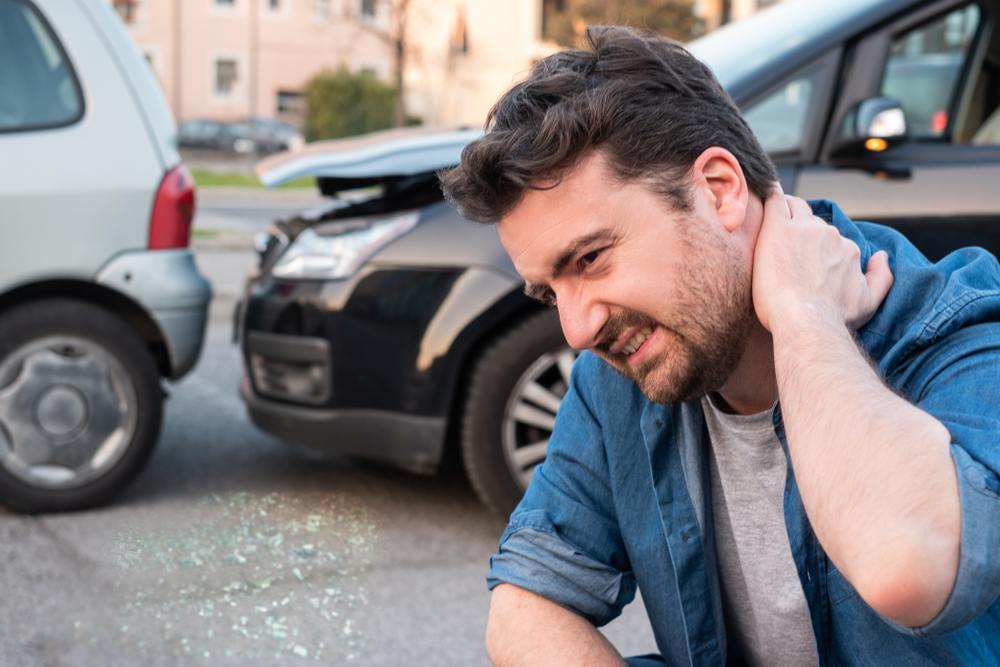
A car accident can be an incredibly stressful and overwhelming experience. Even what might be considered a minor accident can still mess with your emotions and leave you feeling shaky and weak. It doesn’t matter if you were the driver or a passenger; a car accident can affect you both physically and emotionally. In fact, if you were in what is considered a minor car accident, you might be tempted to dismiss how you feel afterward by assuming it will go away after a few hours. But you want to get a thorough examination after even the most minor of accidents to ensure you weren’t injured. The shock of getting into a car accident can lead to a delayed car accident injury, where you might not recognize signs and symptoms right away. Shock from a car accident can leave you feeling disoriented and overwhelmed by the traumatic event that just occurred. Here’s what you need to know about shaking and other symptoms of shock after a car accident and what that might mean for you.
Post-Traumatic Stress after a Car Accident
If you were involved in a car accident, you could experience symptoms of post-traumatic stress afterward. While we tend to associate PTSD with something veterans deal with, it can actually happen to anyone. If you experience a traumatic event, your body may react with distressing dreams and intrusive thoughts or make you want to avoid certain thoughts or situations. After a car accident, you might feel reluctant to get behind the wheel again or drive past the place where the accident occurred. If you or someone else was seriously injured in the accident, you might feel overwhelmed with feelings like guilt and fear that it could have happened to you.
Some people experience PTSD symptoms for just a few days, while others may deal with PTSD after a car accident for months or even years. It can take a while to mentally recover from the trauma of a car accident, and post-traumatic stress can manifest both emotionally and physically. Shaking hands, taking short breaths, and tensing your muscles are all physiological responses to stress you might experience after a traumatic event like a car accident.
Signs of Shock after a Car Accident
In the immediate aftermath of a car wreck, your body can go into shock as it responds to the trauma. This type of physiological response is part of the body’s fight or flight mechanism, which can release a surge of adrenaline. The flood of adrenaline can cause your heart rate to increase and lead to sweating, rapid breathing, and more disorienting sensations. Adrenaline may even mask the pain or symptoms of an injury, making it difficult to recognize the full extent of your injuries. Here are some common signs of shock to watch for:
- Pulse Changes: Shock can cause your pulse to become rapid and weak as your body attempts to cope with the stress of the accident.
- Rapid Breathing: You may start breathing quickly and shallowly, a common response to both adrenaline and stress.
- Lightheadedness: Feeling faint or dizzy is a common symptom of shock when your brain might not be getting enough oxygen.
- Cool, Clammy Skin: Your skin may become pale, cool, and clammy to the touch because of reduced blood flow to the extremities.
- Dazed Feeling: You might feel disoriented or in a daze, struggling to focus on what’s happening around you.
- Dilated Pupils: Paramedics may check for dilated pupils, a physical sign of shock.
- Nausea or Vomiting: The body’s response to severe stress can also affect your digestive system, leading to nausea or vomiting.
- Fatigue and Weakness: Despite the rush of adrenaline, shock can cause extreme fatigue and weakness as your body tries to recover.
- Loss of Consciousness: In severe cases, shock can cause a person to lose consciousness temporarily.
If paramedics arrive at the scene of an accident, they will likely assess you for signs of shock. They may check your pulse, observe your breathing patterns, and look for physical signs like dilated pupils and cold chills after a car accident. Early recognition of these symptoms is crucial, as shock can lead to more serious complications if left untreated. Remember to prioritize your well-being after a car accident and seek medical attention to address any underlying injuries.
Delayed Symptoms of a Car Accident Injury
Because of the shock and trauma of a car accident, you might experience a delay in symptoms. This means you might not notice any pain or discomfort immediately after the accident. But once you get home and have a chance to relax and shaking after a car accident melts away, delayed symptoms may start to set in. Some car accident injuries can also lead to swelling and inflammation, which can occur gradually. As swelling and inflammation get more severe, you might notice an increase in pain and other symptoms.
Headaches are also a common delayed symptom after a car accident. What might just seem like minor head pain from the stress of getting into a car accident may develop into something more if you have an underlying injury you don’t know about. If your car sustained any kind of damage in the accident, then it’s likely that your body did too. With that in mind, your muscles, bones, and joints were likely pressured and stressed from the force of impact. As strains, sprains, or other injuries set in, you may start to notice pain, soreness, tenderness, and stiffness start to set in.
How Adrenaline Can Hide Injuries from a Car Accident
Adrenaline is a hormone that helps trigger the fight or flight response so that your body is prepared to handle a dangerous situation. When adrenaline floods your system during a traumatic accident like a car wreck, your body can better respond to the stressful situation and help you think better and stay safe. However, adrenaline can also mask pain and other symptoms. The effect of adrenaline is often referred to as stress-induced analgesia, which means it can prevent you from feeling any pain, even if you have a serious injury that needs attention right away.
Right after the wreck happens, adrenaline can help you keep a cool head and stay calm while you check on yourself and others to make sure you are safe or get the help you need. Once your body recognizes you are in a safer space, you might experience the effects of the adrenaline as it leaves your body, which might leave you feeling tired, weak, clammy, and shaking after a car accident.
Common Car Accident Injuries with Delayed Symptoms

You might be surprised to learn that shock and adrenaline after a car wreck can keep you from recognizing obvious visible injuries, like serious bleeding or a broken bone. However, other common car accident injuries can easily get missed if you end up with delayed symptoms after a car wreck, like uncontrollable shaking after an injury. Here are examples of common car accident injuries with delayed symptoms and how they could impact you.
Whiplash
Whiplash is the most common car accident injury and can cause pain and other symptoms in your head, neck, shoulders, and upper back. The force of impact when another vehicle collides with yours can cause your head and neck to suddenly jolt forward and backward rather violently. When this happens, your neck muscles may strain out of their typical range of motion, and other damage to your spine and soft tissues may occur, which is known as a whiplash injury. You might not even realize you have a whiplash injury right away because it can take time for the pain and discomfort to set in after the wreck. In the hours or days afterward, you might start to notice an increase in headaches, muscle stiffness, and difficulty turning your head in certain directions. Whiplash can even affect your spine and neck and aggravate nerve endings, which may result in tingling and numbness that extends into your shoulders, arms, and hands.
Head Injury
A traumatic brain injury can occur if you suffer a blow to the head during a car accident. You may hit your head on the steering wheel, the window, or another part of the vehicle. Even what seems like a small bump in the moment can have a lasting impact and will need to get checked out by a medical professional as soon as possible. Head injuries should always be taken very seriously, and you always want to err on the side of caution. A car crash concussion is the most common type of traumatic brain injury and can lead to uncomfortable symptoms that can cause physical, cognitive, and emotional effects in the hours, days, and weeks afterward. What might seem like shock or stress from getting into a car accident could actually be symptoms of head trauma and require immediate medical attention.
Spine Injury
Your spine can absorb a lot of stress and pressure in the event of a car accident. When two vehicles collide, it can cause your whole body to jolt around and cause you to twist and bend in unnatural ways. This can lead to various spine injuries that can cause pain and discomfort that may take a while to set in. A spine injury like a herniated disc might only show signs and symptoms when you move a certain way, and immediately after the accident, you might find yourself moving more gingerly. Car accidents frequently cause misalignments in the spine, which can disrupt the healthy functioning of your central nervous system and lead to symptoms that show up all over the body.
Soft Tissue Injury
Soft tissue injuries, like muscle strains, sprains, and bruising, are also common in car accidents and often have delayed symptoms. You might not notice the pain and swelling until several days later as your body begins to heal and inflammation sets in. These injuries can cause significant discomfort and limited mobility, requiring medical treatment and physical therapy for proper recovery. Timely medical intervention for soft tissue injuries is crucial to prevent chronic pain and jumpstart the healing process. A car accident doctor can provide a comprehensive evaluation, diagnose the extent of your injuries, and develop a tailored treatment plan just for you.
How to Stop Shaking after a Car Accident
Immediately after an accident, you will want to take a few seconds to take deep breaths. Not only do deep breaths help ground you mentally, but they also help bring necessary oxygen to your brain and body so you can handle the stressful aftermath. In some cases, people experience essential tremors after a car accident, which can cause prolonged trembling. You may not be able to stop shaking after a car accident until the shock and adrenaline wear off, so make sure you make time for rest and relaxation once you get home after such a stressful event.
Address Shaking After a Car Accident at AICA Marietta
A car accident doctor can help you manage these symptoms and provide the necessary treatment for any injuries. At AICA Orthopedics in Marietta, our team of specialized car accident doctors can evaluate your condition and develop a personalized treatment plan. Our doctors will provide a thorough assessment to ensure that all potential issues are identified and treated promptly. By receiving prompt medical care, you can significantly reduce the chances of long-term complications and improve your overall recovery.
Visit AICA Orthopedics in Marietta to learn more about how our team of car accident doctors can help you manage your symptoms and get the treatment you need for any injuries.